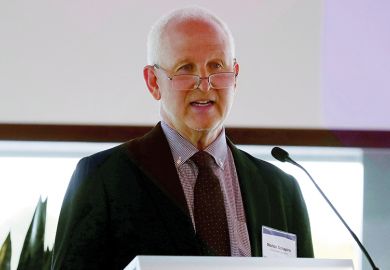“So, is it Boris’ last week?”
Morton Schapiro launches into the interview with Times Higher Education like an old friend in the pub. Many university leaders taking part in the Talking Leadership series bring a media chaperone or at least have a sleek logo-adorned Zoom background. The president of Northwestern University – ranked joint 24th in the World University Rankings – sits alone in front of his fridge and begins with a casual discussion of UK politics.
Schapiro has led Northwestern, a private research university with 19,000 students on the banks of Lake Michigan, since 2009, before which he was president of Williams College in Massachusetts.
“Do you think it was naivety or hubris?” he asks of Johnson. “The guy thinks almost like Trump.” As an economist of higher education who has met and advised many US presidents and politicians over four decades, he’s in a position to know.
Barack Obama did the most for higher education by widening access, he says, and former secretary of state Colin Powell was one of the smartest people he’s ever met. He was less impressed with Ronald Reagan’s attempt to “gut the Pell grant”, which helps many low-income Americans attend university.
Broadly, he thinks politicians are smarter than you’d think.
“I don’t know any of them in it for the ego and the gain other than Trump,” he says. “They’re performers. I guess we’re all kind of performers. But they’re just better at it than we are.”
He’s a fan of President Biden but does have one concern.
“I have tremendous respect for the guy. It’s just the question: can you be effective in a nasty world when, by your nature, you’re not nasty?” It may be a revealing question, given Schapiro has been what most would describe as an effective university president for 22 years.
Controversy
Schapiro doesn’t so much court controversy as embrace it like an old friend. He has infuriated the right by championing safe spaces and been labelled “king of the snowflakes” by Fox News (“at least they mention me”). Meanwhile his latest book, Minds Wide Shut, laments the rise of rigid certainty in politics and preaches reasonable debate. “If people from the far left read it, they would hate it,” he says.
Schapiro is a fan of the comment piece – “I’ve written about everything I’ve ever thought, for better or worse” – and displays a keen understanding of the machinations of the media world.
“If you’re going to write op-eds about how we should get more money for research, well, that’s nice,” he says, in the manner of someone patting you on the head. But “you’re not going to get that published in the Wall Street Journal or the FT or the New York Times”, he adds. “They’re not going to publish it unless some people are going to take exception to it.”
Each time he writes one he receives hate mail; often the senders say they will never donate to the university again.
“Usually they’ve never given a first time, to be honest with you. Sometimes I look them up,” he says with a smile. Although he admits his outspokenness has cost them gifts.
As well as being extremely media savvy (he researches the work and background of journalists who interview him), is it possible he enjoys the controversy? His first answer is no. But then he pauses and smiles.
“As an economist, we believe you don’t ask people questions about their preferences. You look at their behaviour, which reveals preferences,” he says. He has written more than 100 articles.
One of the biggest mysteries of Schapiro might be how he has stayed in the job, given this proclivity for contention. “My theory is I’m short so people feel sorry for me. If I were taller, I probably would have been fired years ago,” he jokes.
More seriously, he thinks other presidents are not so outspoken because they “live in fear of going back to the faculty. They haven’t taught or published [in] forever.”
“I’ve never lived in fear of that. Fine, sack me. I’m a professor of economics with tenure; there's a lot worse life than that,” he says. “Yeah, my salary would go down by 60 per cent. But it would still be a really good salary. I'm not a literature professor who’s underpaid. I’m an economics professors paid very, very well.”
He admits he is shielded by his many years in the job. “I’ve been on the dark side of administration since 1994. It’s much tougher now.”
There are some situations he avoids, however. He will no longer testify to government because of the conflict between being a higher education economist and a university leader. In 2001, sitting on a panel with Ivy League presidents, he explains, they were asked whether the government should invest more in higher education. Unsurprisingly, the others said yes, while his response was “as opposed to what? As opposed to K-12? No.” He told them they should allocate money intelligently, and the rate of return on early interventions is higher than anything else.
“I’m not going to testify as an economist because they’ll think that I’ve gone over to the dark side as a president. I’m not going to testify as a president and just say things that are not empirically true.”
Widening access
One of his main passions at Northwestern has been widening access to poorer students. He pioneered the Northwestern Academy for Chicago Public Schools, which targets students who applied to selective colleges and universities but weren’t accepted. The programme takes them on tours of good universities, tutors them in standardised tests and runs improvisation workshops to improve their public speaking and boost their confidence.
What does he make of the people who say you can’t widen access and improve excellence?
“It’s just not true. The data are so clear on that,” he says. “You widen your perspectives about who could succeed and guess what? They succeed.”
Northwestern takes into account the school attended along with the grades achieved. “If you go to an under-served school and you get a score that would be humiliating if you were at one of these ritzy schools, but it’s the highest anyone’s had for years at your school, you take that kid. You absolutely take that kid,” he says.
Under Schapiro, Northwestern’s pool of financial aid has risen from $80 million (£58.8 million) to about $205 million. In 2016, he announced an initiative to eliminate loans from financial aid packages, in order to help students graduate without being saddled with debt. He announced a goal to admit an entering class consisting of at least 20 per cent Pell Grant-eligible (low-income) students by 2020, which they reached in 2018.
Ethnic diversity has also increased; the share of black students has risen from 7 to 12 per cent and of Hispanic students from 9 to 17 per cent. The percentage of students from surrounding low-income districts has doubled, from 3 per cent to 6 per cent.
His passion is fuelled by his own background.
“I went to a pretty under-served high school and most of my friends didn't go to college,” he says.
“I’ve had a decent career as a professor and as an administrator, but I was far from the most talented person I knew when I was at high school. I wasn’t a hidden gem; I was one of many potential gems if people gave a damn about them.”
He is also motivated by his Jewish faith – “I believe we’re only here in this world to heal it, to repair it” – and isn’t afraid to call out antisemitism.
In October 2020, students protesting against Northwestern campus police stood outside his house in the early hours of the morning shouting “pig”. He reacted with a strongly worded open letter, writing: “I ask you to take a long hard look in the mirror and realise that this isn’t actually ‘speaking truth to power’ or furthering your cause. It is an abomination and you should be ashamed of yourselves.”
Protesters also chanted “from the river to the sea”, a phrase denouncing the existence of Israel, and he has received emails calling him a “dirty Jew”. He doesn’t believe antisemitism is on the rise, though; he doesn’t think it ever went away.
“I was born eight years after the liberation of Auschwitz; a quarter of my family was burned in ovens. Was I surprised at Charlottesville, with the white supremacist chanting: ‘Jews will not replace us’? Not at all,” he says. “There are a lot of victims out there, it’s not just Jews, but boy they do seem to focus on Jews.”
Changing career
Schapiro will be stepping down as president this summer and ending his four-decade teaching career. Perhaps with his political connections and media savvy he’ll go into politics himself? In fact, he is following in the footsteps of many of his students. “I’m really obsessed about climate change. As an economist, it drives me crazy the way we price out sustainable energy alternatives,” he says.
His plan is to “declare victory after 43 years of consecutive undergraduate teaching and move on to the business world” by investing in sustainable energy. No doubt he will pen some comment articles along the way.
Quick facts
Born: New Jersey, 1953
Academic qualifications: BSc in economics from Hofstra University; PhD in economics from the University of Pennsylvania
Lives with: His wife; they have three grown children
Academic hero: Economist Richard Easterlin
This is part of our “Talking leadership” series of 50 interviews over 50 weeks with the people running the world’s top universities about how they solve common strategic issues and implement change. Follow the series here.
Register to continue
Why register?
- Registration is free and only takes a moment
- Once registered, you can read 3 articles a month
- Sign up for our newsletter
Subscribe
Or subscribe for unlimited access to:
- Unlimited access to news, views, insights & reviews
- Digital editions
- Digital access to THE’s university and college rankings analysis
Already registered or a current subscriber?








